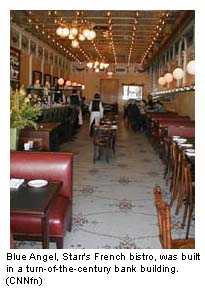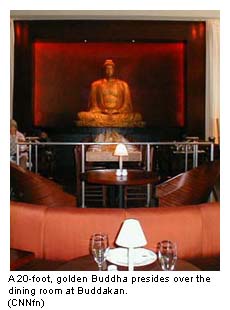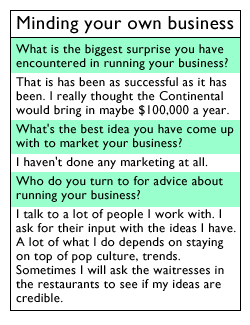|
Philadelphia's super Starr
|
 |
September 8, 2000: 5:12 p.m. ET
Creative restaurants credited with breathing new life into a neglected Philly neighborhood
By Staff Writer Hope Hamashige
|
NEW YORK (CNNfn) - To call Stephen Starr, Philadelphia's most prolific and eclectic restaurateur, a restaurateur is sort of missing the point.
Sidle up to the handcrafted French zinc bar at Blue Angel, take in some French tunes and order a glass of Pernod. You won't be able to avoid admiring the intricate milk glass designs that adorn both walls and ceilings in this French-style bistro.
Take a few friends to Tangerine, sort of a hipster's vision of a Moroccan  casbah, let them relax in one of the candle-lit dining rooms on luxurious velvet surrounded by wood screens and delicate lattice work and try to make them remember they are in homely Philadelphia. casbah, let them relax in one of the candle-lit dining rooms on luxurious velvet surrounded by wood screens and delicate lattice work and try to make them remember they are in homely Philadelphia.
Each Starr establishment is an original. His four downtown Philly restaurants -- The Continental, Blue Angel, Buddakan and Tangerine -- serve food from four different continents in four very different settings.
Each one seems to have nothing in common with the others until you note that each is a near perfect blend of good food served in unforgettable environments. Together, the experience is nothing short of theatrical.
Starr's small restaurant empire began in 1995 with the opening of a tiny diner called The Continental in Philly's Old City. Since then he has opened three more restaurants, all within about seven blocks of The Continental.
When he opened The Continental, Old City was a desolate corner of Philadelphia. That the neighborhood has improved dramatically since Starr arrived is clear. Since The Continental first drew attention, and a crowd, in 1995, many merchants and other restaurants moved into the previously shuttered storefronts, breathing new life into Old City.
A lot of people in Philadelphia think the Old City would still be forgotten and, possibly, a little scary had Stephen Starr not moved in and created exactly what the neighborhood needed -- one successful business that drew visitors from all over town and the Philly suburbs.
West Philly asks for an encore
Now, Starr is being asked to do it again -- this time in West Philadelphia in the neighborhood adjacent to the University of Pennsylvania. Penn recruited Starr months ago to create a new restaurant on one of the university's properties as part of the school's plans to bring more development to the community.
"He knows exactly what it is people find exciting," said Tom Lussenhop, Penn's managing director for real estate, who helped seal the Starr project.  "The fun environments he creates are exactly the types of places you see around great urban universities." "The fun environments he creates are exactly the types of places you see around great urban universities."
University officials, added Lussenhop, hoped to get Starr to bring a restaurant to West Philadelphia in part because they hope his local notoriety can lure more retailers to their long-neglected part of town, across the Schuykill River from downtown.
Starr describes this creation, which really defies description, as "retro-futuristic."
"I'm not sure that makes sense," he said a second later. "Try to imagine you were going to build a futuristic restaurant in Japan in the Sixties. It's something like that."
When it opens in October, Pod may be the most unusual of all the Starr restaurants. Stark white interiors are going to be bathed in lights of different colors and in some seats, patrons will be able to choose whether they want to eat their food under blue, red or ochre lights. The huge, open space is going to have dozens of video screens projecting images of the diners interspersed with other taped material like Japanese anime that will be projected inside the restaurant and out on the street.
Starr admits he feels a lot more pressure with this project than he has with his others. For one thing, people's expectations for an interesting experience have grown with each new project. The fact that the university has hopes of its own for urban renewal attached to Pod's success is added pressure for him to succeed.
"I definitely feel a lot more pressure with Pod," he said.
Kitsch-chic draws huge crowds
The Continental was a shuttered diner in a seedy part of the Old City, Philadelphia's most historic district, when Starr decided to start a restaurant. The former concert promoter had sold his business five years earlier to a competitor and decided to try his hand at something new.
"I had mixed feelings about it at the time," he said. "I used to drive by and there were always homeless people camped out in front of the diner. I had a lot of reservations."
 He knew this: The idea was cool. Turn a Fifties-style diner into a kitschy, fun restaurant and martini bar. The diner's interiors were vintage in a retro-hip sort of way. Pump in a little Tony Bennett, mix some mean martinis, serve up some inspired tapas and he knew he would have a great hangout. He knew this: The idea was cool. Turn a Fifties-style diner into a kitschy, fun restaurant and martini bar. The diner's interiors were vintage in a retro-hip sort of way. Pump in a little Tony Bennett, mix some mean martinis, serve up some inspired tapas and he knew he would have a great hangout.
He spent about $200,000, money he had from the sale of his concert business, fixing the old diner up, mostly on kitchen equipment, but also on cool light fixtures. The investment quickly paid off. When The Continental opened, the corner that houses the restaurant and bar changed overnight as people quickly warmed to The Continental's quirky charm.
Before long, The Continental was grossing about $3.5 million a year. That first success enabled him to quickly expand his businesses and also to make them more lavish. Tangerine, the most recent of Starr's restaurants, opened this spring. He spent $2.8 million converting a former Ace hardware store into a Moroccan paradise. Starr said that restaurant will gross $5 million its first year.
Starr's success lay not only in tapping into Philadelphia's very secret desire to be cool, but also in helping to spark an economic turnaround of the Old City, a quaint and historic neighborhood near Center City that most Philadelphians had given up on a long time ago.
Starr admits that Old City, the neighborhood where he now has three restaurants, has changed dramatically in the last few years. Rather than take all the credit, he believes a confluence of factors contributed to Old City's resurgence.
"I opened The Continental at the perfect time. The economy was getting better, people were starting to have more money to spend. I got the vibe that this was turning into a hip neighborhood," he said.
An unlikely restaurant owner
Starr, 44, is the first to admit he is an unlikely owner of restaurants. He has never worked in one and says he never had the desire to. Frequently in meetings with restaurant personnel, Starr stops the conversation because they begin throwing around culinary terms, many of which he still hasn't mastered. Five years after opening his first establishment, he still can't mix a drink.
Food and drink are not his strong points, but he has used his considerable strengths to built his restaurants. Keeping one eye trained on pop culture became second nature to Starr after years in the music business.
"I have to stay on top of trends because what I am doing is creating environments," he said.
To minimize the inherent risk, Starr also employs a tactic from the music  business to test his restaurants before he moved forward with the ideas he is batting around in his head: He conducts focus groups. Generally, they are informal gatherings where he poses his ideas to a small group of people he thinks will be the target audience. business to test his restaurants before he moved forward with the ideas he is batting around in his head: He conducts focus groups. Generally, they are informal gatherings where he poses his ideas to a small group of people he thinks will be the target audience.
Whether he admits it or not, gathering information for future projects is a habit he can't kick. He frequently questions friends and employees, sometimes even visiting reporters, what kind of music they listen to, why they don't like hanging out in a particular restaurant or bar and whether they would find it fun to have their sushi delivered to them on a conveyor belt.
He also puts his musical background to work in ways that most restaurant owners can't. He handpicks tracks for each restaurant and sends it to a company in Florida that burns his choices into CDs. The music is chosen to highlight the theme of the restaurant -- French for Blue Angel, world music and African beats for Tangerine -- and timed for different parts of the day.
Even though he's not sweating it out in the kitchen like some restaurant owners, Starr still keeps a backbreaking schedule. He typically puts in 16-hour days, trotting from restaurant to restaurant to make sure everything is proceeding without a hitch.
"It requires incredible attention to detail," he said.
No slowdown in sight
These days, with two new restaurants opening in the next few months, he is overseeing construction, planning menus and opening night parties in addition to his regular oversight duties.
The office he keeps, next door to The Continental, is littered with dishes and silverware, swatches of material to make curtains and even samples of white tuffets that are going in the bar of Pod. In typical Starr fashion, even the tuffets are something spectacular. The bases light up when someone sits atop.
If there is any downside to success, in Starr's mind, it is that his local notoriety has made opening new restaurants a lot more complicated. He rented The Continental "for the price of an apartment" just a few short years ago. Much to his dislike, landlords are trying to negotiate extremely complicated and expensive deals, including asking for a percentage of Starr's profits. But that isn't slowing his pace. He is collaborating with two of New York's famed chefs -- Douglas Rodriquez and Masaharu Morimoto -- who want to open restaurants in Philadelphia.
"The fun part for me is creating the concepts," he said. "Budgets and leases and contracts take all the fun out of it. I really have become my own worst enemy." 
|
|
|
|
|
 |

|

